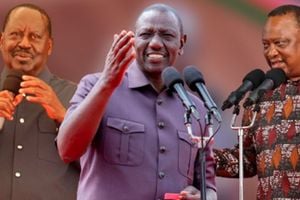Gender lessons from Rwanda in political leadership

Rwanda's women legislators in parliament. The country has the highest ranking for female representation across the world.
What you need to know:
- Of the 80, 53 are elected from a fixed list of candidates nominated by political organisations or independent candidates elected by direct universal suffrage based on proportional representation.
- An additional two—man and woman—are elected by the National Youth Council, while the National Council of Persons with Disabilities elects one person, man or woman, to represent its interests.
Forty-six out of 80 members of Rwanda’s Chamber of Deputies, equivalent to Kenya’s National Assembly, are women. This makes a 57.5 per cent representation.
Article 75 of Rwanda's constitution of 2003, revised in 2015, provides for election of 24 women representatives.
Of the 80, 53 are elected from a fixed list of candidates nominated by political organisations or independent candidates elected by direct universal suffrage based on proportional representation.
An additional two—man and woman—are elected by the National Youth Council, while the National Council of Persons with Disabilities elects one person, man or woman, to represent its interests. In the current chamber, a woman has been elected to represent the youth and a man elected to represent persons with disabilities.
The ruling Rwandan Patriotic Front has the largest share of the women seats (15), followed by Social Democratic Party and Liberal Party with two each. The Party for Progress and Concord and Social Party also have one woman each.
Gender compliance
Unlike in Kenya where political parties have to be literally forced to adhere to Article 27 of the Constitution, the situation is different in Rwanda.
“The bottom line is that there is an organic law and political parties have to adhere to it. They know inclusion is not someone [else’s prerogative] to decide. It is a must. It is a must that it has sunk deep into our deeds,” explains Emma Furaha, a member of Chamber of Deputies and chairperson of the Committee on Political Affairs and Gender.
“After genocide, we had to come up with a governance model and we agreed that it has to be inclusive. No Rwandan should be left behind. It is a matter of everyone having opportunities to participate [in the country’s development] and providing an enabling environment [in that respect].”
Article of the organic law No 19/2007 of 04/05/2007 governing political organisations and politicians prohibits them from creating organisations based on any factor that may lead to discrimination and divisionism, including sex.
They are also required to ensure that at least 30 per cent of the posts that are subjected to elections are occupied by women. This is in addition to adhering to the principle of “constantly reflect[ing] the unity of the people of Rwanda and gender whether in recruiting members, setting up administrative organs and in its functioning and activities”.
Furthermore, Rwanda’s constitution does not give political parties the liberty to decide which way to go. Article 75 is strongly affirmative that “at least 30 per cent of the deputies must be women.”
Electoral colleges
Voting leaders in Rwanda differs from Kenya in that the deputies are pre-elected through the electoral colleges. The list is then submitted to the National Electoral Commission, which confirms them after the people have voted for the parties.
Each political party is allocated a number of deputies proportionate to the votes cast in its favour. And so when those on the list go out to campaign, they do so for the party to win majority votes and not to popularise themselves as is the case in Kenya.
“The people will vote for my political party. They do not vote for me as an individual. After the elections, the National Electoral Commission releases the results,” explains Valens Muhakwa, a member of the Chamber of Deputies and chairperson of the Public Accounts Committee.
“It then announces the names [of the deputies] from each political party [considering the number of deputies allocated based on votes cast in their favour] in order of their listing.
“When it comes to allocating positions, the principle is that the political parties must obey the 50/50 per cent principle. If Social Democratic Party, for example, is making a list, if number one is a man, number two must be a woman.”
For the women representatives, however, the path to the chamber is different. They are elected by specific electoral colleges in the five regions, namely Northern, Southern, Eastern and Western and City of Kigali. Hence, they have to go out to campaign on their own without a political affiliation.
No violence
Ms Furaha says there have never been cases of violence against women during campaigns or elections in Rwanda. “Violence here is not a norm. We learnt a big lesson that violence is not good,” she says.
In fact, women aspirants seeking election in the same region go out together to campaign.
“Say, there are 60 women campaigning for the women's representative seat in Western province, you go together in the same bus. You go singing, cheering yourselves, [and] teasing each other. It’s actually fun,” she says.
And when they are elected, they don’t carry the tag of ‘Nairobi or Kiambu’ woman representative. They are simply women representatives, representing all women of Rwanda.





